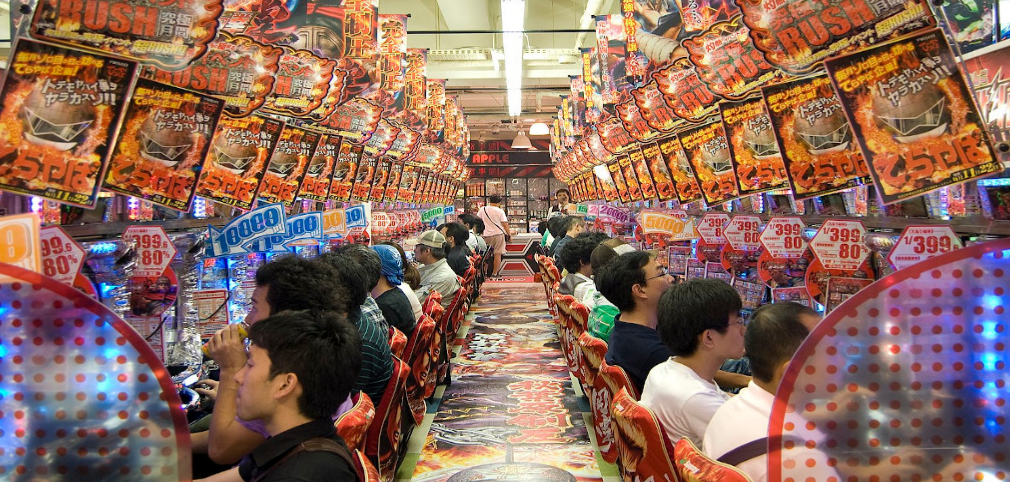While certain forms of gambling like Pachinko, horse racing, and lotteries are legal and regulated in Japan, traditional casino-style gambling has largely been prohibited.
Legalized Forms of Gambling in Japan
Pachinko and Pachislot
Pachinko is often described as a cross between pinball and a slot machine. It’s an incredibly popular form of entertainment in Japan, with pachinko parlors dotting city landscapes. Players aim to capture as many steel balls as possible, which can then be exchanged for prizes. Pachislot machines are similar to slot machines in western casinos but have their unique Japanese touch.

Lottery
The Lottery in Japan is a government-backed system, with tickets available for purchase at licensed vendors throughout the country. There are various lottery formats, including scratch tickets, number selection games, and the popular jumbo lottery with its substantial prizes. The funds collected often go towards public projects, such as infrastructure development and cultural initiatives.
Horse Racing, Bicycle Racing, and Motorboat Racing
These three forms of racing are unique in that they are both a sport and a form of legalized gambling. In Horse Racing, spectators can place bets on their favorite horses. Similar betting systems exist for Bicycle Racing (known locally as Keirin) and Motorboat Racing. The races are not just popular as gambling outlets but also as sporting events, with significant followings and televised races. They are strictly regulated by government bodies to ensure fair play and the integrity of the betting systems.
Consequences of Illegal Gambling in Japan
Legal Penalties and Fines
Engaging in illegal gambling activities in Japan can lead to severe legal consequences. Those found guilty can face hefty fines, often reaching millions of yen, depending on the severity and scale of the operation. Apart from monetary penalties, imprisonment is also a possible outcome for both operators and participants, with sentences ranging from months to several years. Moreover, repeat offenders might find themselves facing even more stringent punishments. The Japanese Penal Code specifically outlines the various offenses and their corresponding penalties related to illegal gambling.
Societal Impacts and Public Perception
The negative impacts of illegal gambling stretch beyond legal ramifications. On a societal level, unchecked gambling can contribute to problems like addiction, family breakdowns, and financial ruin. The public perception of illegal gambling is generally negative, seeing it as a potential cause of crime and other antisocial behaviors. Many view such activities as a drain on economic resources and a cause for decreased public safety. The media often reports on the repercussions of gambling, further strengthening the negative public perception surrounding it. As a result, those involved in illegal gambling may face ostracization from their community, further complicating their personal and professional lives.
Exceptions and Recent Legal Developments in Japan
Integrated Resorts (IR) and Casino Legalization
Japan has been gradually moving towards a more open stance on casino gambling, especially with the introduction of the Integrated Resorts (IR) concept. An Integrated Resort is a comprehensive entertainment complex, combining casinos with other amenities such as hotels, shopping centers, and conference facilities. The push for IRs aims to boost tourism and invigorate local economies. While traditionally casinos were illegal, the government’s decision to allow them within these IRs represents a significant shift in policy.
Future Prospects for Gambling Laws
As Japan sees the potential economic benefits of relaxed gambling restrictions, there’s ongoing debate and discussion regarding the future of its gambling laws. Advocates argue that further liberalization can lead to increased tourism, job creation, and tax revenue. However, concerns remain about potential increases in gambling addiction and associated social problems. Online gambling, currently largely restricted, might see some changes in regulations, given the global trend towards its acceptance. Japan’s National Diet continually assesses and debates these topics, aiming to find a balance that benefits the country while ensuring societal well-being.

Comparison with Other Countries
Gambling Regulations in Neighboring Countries
Different countries in Asia have distinct approaches to gambling, influenced by cultural, historical, and economic factors. For example, Macau, often referred to as the “Las Vegas of Asia,” has fully embraced casino tourism, reaping substantial financial benefits from its many casino resorts. On the other hand, South Korea permits casinos but has restrictions for its residents, allowing only foreigners to gamble in most of its casinos, except for one – Kangwon Land. Similarly, Singapore has adopted the Integrated Resort model successfully with venues like Marina Bay Sands and Resorts World Sentosa.
Impact of Foreign Gambling on Japan’s Policies
Japan’s policy evolution regarding gambling can’t be seen in isolation. The success stories of casino tourism in places like Macau and Singapore have undoubtedly had an impact. Additionally, the popularity of Japanese tourists in foreign casinos, especially in places like Macau, indicates a potential untapped market within Japan itself. However, there’s also caution derived from studying issues faced by these countries, such as gambling addiction and potential increases in crime. The continuous observation of international gambling trends shapes Japan’s policies, ensuring they adopt best practices while mitigating potential risks.

